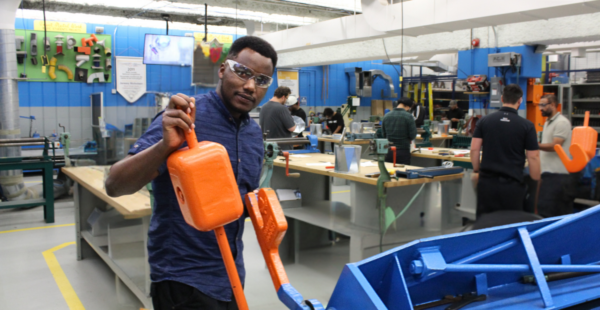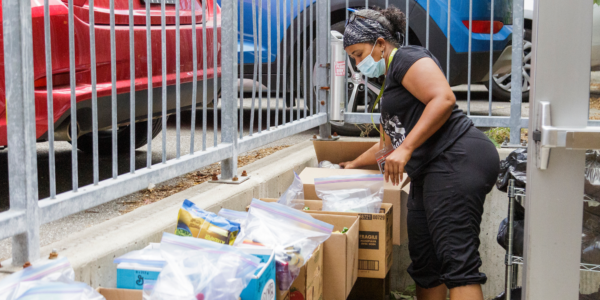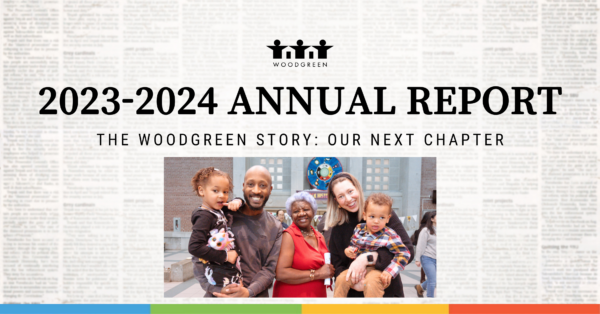- Co-written with Sarah Ibrahim, Public Affairs Assistant
Throughout the month of November, WoodGreen senior leaders, directors, and staff met with close to 40 MPPs, ministers, and government officials to discuss WoodGreen’s programs and services and opportunities for partnership, modelling, and expansion. This event was an opportunity for WoodGreen to represent the community care sector and present a business case as to why there must be additional investment in community care services, mental health and addictions programs, services for seniors, financial empowerment programs, and employment services and other unique WoodGreen programs as the Ontario government prepares its next budget.

As part of this initiative, on November 22, government staff and officials were invited to WoodGreen’s breakfast reception at the Ontario Legislature. WoodGreen’s leadership, directors, and staff mingled with more than 40 MPPs, ministers, civil servants, and government staff to raise awareness about WoodGreen’s programs and services. Sean Mullin, Chair of WoodGreen’s Board of Directors, welcomed all the attendees to the event with a few words about WoodGreen and thanked everyone for taking the time to speak with our representatives and committing to help us advocate for further support.
The need for additional investment into community care


One of the issues we discussed with government representatives is the need for increased funding for community care services. In recent years, demand for WoodGreen’s community care and senior wellness programs and services has increased and continues to surpass expected targets. This is likely due to an aging population. Canadians 65 years of age and older now represent the fastest-growing demographic in the country. By 2031, nearly a quarter of Canadians will be aged 65 years and older. These seniors need community care supports to ensure they can live healthy and well at home for as long as possible.
WoodGreen discussed one of our solutions to alleviating the pressure off of long-term care and helping seniors live at home, our Cluster Care assisted living model. This model provides frail seniors with shared living spaces that have full-time assisted living services. We know there is a growing number of patients occupying acute care settings but do not require the intensity of services in acute care, also known as alternative level of care (ALC) patients. Cluster Care enables support for seniors, who are experiencing advanced frailty, including those with mental health and neurological disorders or those labelled as ‘alternate level of care’ (ALC) patients.

It gives clients the opportunity to live independently and prevents alternate level of care (ALC) clients from occupying hospital beds. It also can bridge the transition from hospital to the community for clients recovering or awaiting a space in a long-term care home.
The needs of seniors living in Toronto are rapidly increasing. During the last few years, the number of seniors contacting our Toronto Seniors Helpline and Crisis Outreach Services for Seniors (COSS) has significantly exceeded provincial targets. WoodGreen also discussed with the government the need for additional funding to increase these services so that we can provide further support for seniors facing physical, cognitive, mental, developmental, and substance-use health challenges.
Finally, WoodGreen shared concerns about the ongoing challenges of recruiting and retaining Personal Support Workers (PSWs) who work in our assisted living, in-home support, and adult day programs. PSWs in home and community care make less money than PSWs that work in long-term care and hospitals. WoodGreen strongly supports further investment to raise the wages of home and community care workers to ensure wage parity between PSWs working in long-term care and home and community care.
Financial empowerment programs must continue to be funded across the province, including in Toronto
WoodGreen also discussed the need for further funding for financial empowerment, financial counselling, and financial literacy services. Financial stability, financial health, and support for employability and employment stability are critical during a time of high inflation. The current affordability crisis is creating hardship for over two-thirds of low/moderate-income Ontarians.

We are seeking government partners to support a Greater Toronto Financial Empowerment project. This project would provide clients access to WoodGreen’s programs and services through Employment Ontario and help them boost their employment retention and financial outcomes. Through Ontario government partners and investment, this collaborative project would provide 20,000+ low-income working-age adults across Toronto with access to financial empowerment services and pathways to employment or self-employment in the trades. The goal of the project is to improve job readiness, wages, and long-term outcomes.
These awareness days are just the beginning


WoodGreen will continue to work in collaboration with the Ontario government and advocate for sector investments.
We are proud to share that during our Awareness Days events, WoodGreen was able to successfully:
- Spread awareness about WoodGreen programs and services.
- Build new and lasting relationships with the government.
- Identify the need and demand for additional funding in community care and financial empowerment.
- Acquire commitments from the government to work with WoodGreen.
With the new government connections made by WoodGreen during our awareness days events, we hope to help even more people by expanding our reach and capacity to meet the demands of the community.
We would like to take the time to acknowledge and thank MPP David Smith (Scarborough Centre) for his ongoing support and for giving a Member's Statement to introduce WoodGreen within the Legislative Chamber. We also extend our thanks to MPP Christine Hogarth (Etobicoke-Lakeshore) for sponsoring our reception at Queen's Park and MPP Doly Begum (Scarborough Southwest) for inviting WoodGreen staff to Question Period and introducing our organization to the chamber.





